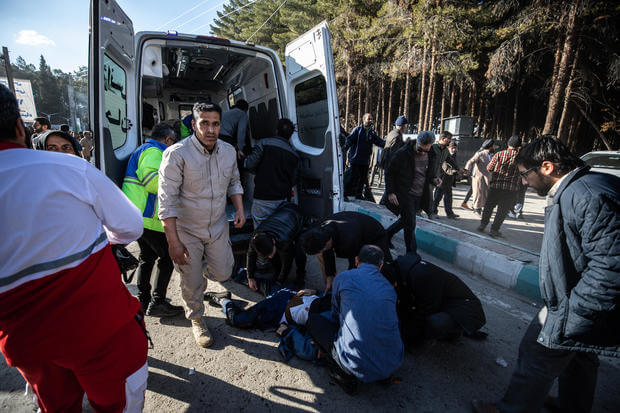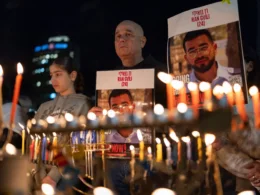On Wednesday, several bombs exploded and killed around 103 people at a commemoration for the former Islamic Revolutionary Guards Corps (IRGC) Quds (Jerusalem) Force Chief Qasem Soleimani.
Soleimani was neutralized in January 2020 by a drone attack ordered by the Trump administration. The former IRGC-Quds Force Chief was notorious for exporting the Islamic Republic's Shiite revolution throughout different parts of the Middle East, including Lebanon, Syria, Yemen, and Iraq.
According to reports, the blasts were minutes apart and shook the city of Kerman, about 510 miles southeast of Tehran.
The second blast sprayed shrapnel into a crowd fleeing the first explosion.
"A terrible sound was heard there, despite all the security and safety measures. The matter is still under investigation," said Reza Fallah, head of the Kerman Red Crescent Society to Iranian-state media.
Iranian state media and officials described the attacks as bombings but did not provide details of what happened. The first bomb detonated at around 3:00 PM, and the other went off 20 minutes later, the Islamic Republic's Interior Minister, Ahmad Vahidi, told state media. Vahidi said the second blast killed and wounded the most people.
The first blast happened about 700 meters from the deceased IRGC Quds Force Chief's grave in the Kerman Martyrs Cemetery near a parking lot. The crowd rushed west along Shohada Street, where the second blast struck about 1 kilometer from the grave.
Iran Supreme Leader Ayatollah Ali Khamenei said the attackers would face a "harsh response," but did not name any possible suspect. Iran President Ebrahim Raisi described the actions as "cowardly," and the perpetrators and leaders would "soon be identified and punished."
Reports noted that Khamenei, Raisi, and members of Soleimani’s family did not attend the commemoration.
Iran's foreign ministry said it would use all international means to identify and bring to justice those involved in the attacks and their supporters.
It did not take long for current commander of Iran's Quds force, Esmail Qaani, to blame the attacks on "the agents of the Zionist regime (Israel) and the United States."
US Department spokesperson Matthew Miller said in a regularly scheduled news briefing that the US was not involved in the explosions in Iran on Wednesday and added that it has no reason to believe Israel was as well.
Iran state media showed a video of pro-regime crowds gathering at the cemetery at night, chanting: "Death to Israel" and "Death to America."
Houthi spokesman Mohammed Abdel-Salam linked the bombings to Iran's "support for the resistance forces in Palestine and Lebanon" but did not blame anyone specifically for the bombing attack.
Hezbollah General Secretary Hassan Nasrallah described the individuals who died in the attacks as "martyrs who died on the same road, cause, and battle that was led by" the former Quds Force Chief.
Following the Oct. 7 massacre by the Iranian-backed terrorist group Hamas, tensions have increased between Iran, Israel, and the US, with the Ayatollahs calling on terrorist proxies in Lebanon, the West Bank, Yemen, Iraq, and Syria to attack American and Israeli forces.
In Yemen, Iran-backed Houthi terrorists have attacked US and commercial shipping vessels, prompting the US naval to send naval ships into the Red Sea to deter Houthi attacks.
In Iraq and Syria, Iran-backed Iraqi Shiite terrorist groups have launched attacks against American military bases and personnel. In southern Lebanon, Hezbollah continues to launch sporadic attacks against Israel to formally open a second front on its northern border.
Related Story: IRGC Says Hamas Attack Against Israel was In Retaliation for Soleimani Death









